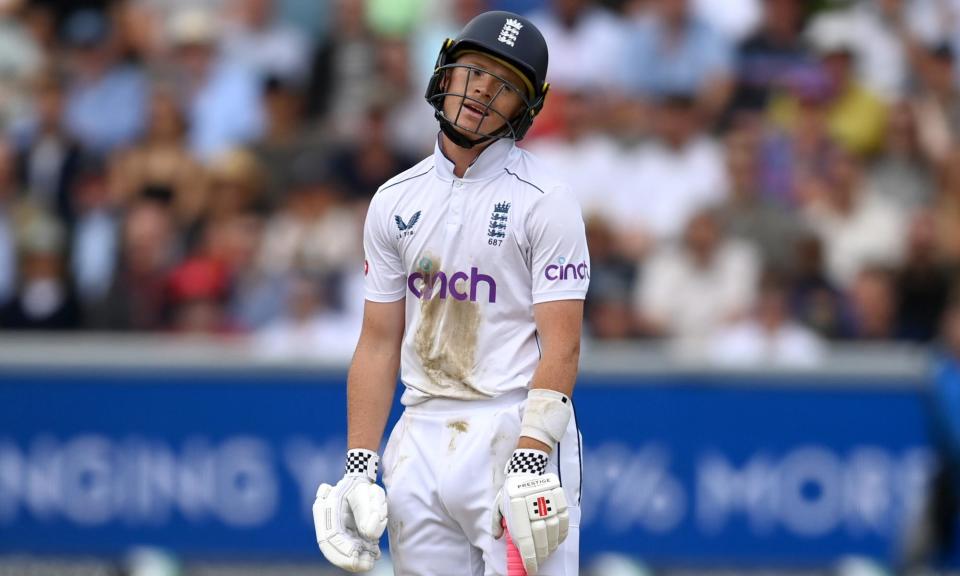Ollie Pope fails again with bat but shows he has mindset to be selfless leader

For all that Ollie Pope’s summer started with two half-centuries and a hundred, he arrived at the crease on Friday evening needing a score. In three innings as stand-in captain he had posted six, six and one, and the run was starting to get embarrassing.
Coming in one ball into the day’s penultimate over, he faced just six deliveries before stumps and looked uncomfortable for most of them. The day ended with England 256 ahead, with one wicket down, and Pope returned on Saturday with his team dealing with no pressure from either scoreboard or clock. He could have consolidated, built, produced the kind of score that would silence the naysayers and relaunch his captaincy, demonstrating that he could lead the team on the field – which he did notably well in Sri Lanka’s first innings – while retaining the bandwidth to bat with a modicum of success.
Related: Joe Root hits record-breaking century to put England on brink of series victory
Instead, as he waited for the start of the 12th over of the day, he watched Sri Lanka spread their field, indicating that they would try to tempt him into an unwise shot against a short ball, and immediately produced an unwise shot against a short ball. Asitha Fernando’s very first bumper was duly dumped into the hands of Prabath Jayasuriya at deep point. It was exasperating, certainly, but there was another way to read it: that this was his finest single moment since taking charge of the team for this series.
What Pope needed in this situation was clear: any kind of score, at any kind of speed, that would keep his critics quiet and let him see out the remainder of his three-game captaincy in peace and in credit – and in doing so position himself as the obvious candidate when England are next in need of a full-time leader. But what his team wanted was something different: runs at decent pace, and for their lead to grow quickly enough to allow them to end their innings in the mid-afternoon, to profit from the best bowling conditions of the match, and to be on the golf course by Monday. And Pope chose team.
In his first press conference as captain, Ben Stokes described his vision for the side: “In terms of on-the-field stuff, a great starting point for me is I want to have selfless cricketers who make decisions based on what they can do to win a game.” The manner in which he lost his wicket was a failure for Pope, but it was also an affirmation, proof of something. It was a poor shot, accomplishing the unlikely task of taking a crowded leg-side field out of play only to perfectly find the solitary deep fielder on the off. But attempting it was so obviously against his interest that he has to emerge with some kind of credit.
A few overs later, Harry Brook tried to mow Jayasuriya over midwicket but the ball caught his top edge and looped up to Nishan Madushka, who had time to set himself, to track its flight, to choose where and how he would take the catch, but somehow still put it down. The very next ball Brook tried precisely the same shot, absolutely nailed it, and though he was dropped again, this time it was by a spectator in the Tavern Stand. It was gleefully received, but this shot and Pope’s represented two sides of the same coin. England may have refined their approach over the last year, dialled down their more ludicrous excesses, but they retain a gambler’s instinct.
Of course a free and selfless mindset goes only a certain way towards allowing a batter to take risks – the presence of a human run guarantee at the other end also helps. Through all of this Joe Root stood watching, waiting his turn, and, when it came, propelling England at pace towards a surely insurmountable total while taking hardly any risks of his own.
By the time England’s lead hit 450, Root was in the 80s and however tempting the declaration, it seemed rude to stop him. There was a glaring inconsistency here: it is hard to see how a side who prioritise the interests of the group over the individual can at the same time allow themselves to base their tactics around letting someone reach a personal milestone. But sport is about nothing if not the pursuit of greatness and as a result, Lord’s witnessed someone who has reached an outlandish goal and just kept going.
At the start of the day, Root at best shared the records for the most centuries on this ground, the most runs, the most centuries for England, and – by way of a bonus – the most catches here as an outfielder. By its end he owned them all. It was a day of glory and of failure, and of one moment that somehow, in its way, managed to combine the two.

